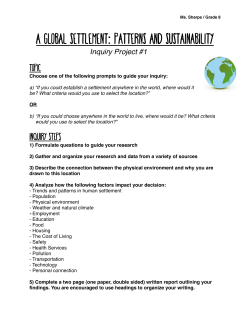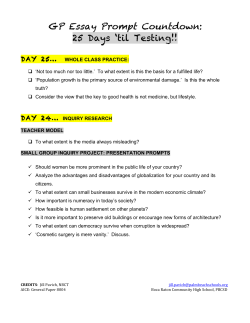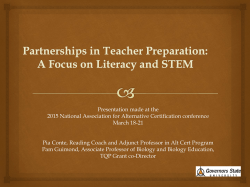
Curriculum Overview Seabrook Primary School Term 2 2015
Curriculum Overview Seabrook Primary School Term 2 2015 Grade Three Dear Parents/Guardians, Curriculum Priorities • English • Maths • Health and Well-being Welcome to Term Two. The Year Three teachers, Mrs. Bahadur, Mrs. Sharon Peterson, Mr. Kevin Wood. Miss. Erin Verdolini and Miss Noni McClure, have enjoyed teaching and learning with your child during Term 1 and are enthusiastic about continuing to build on this in Term Two. This term we will continue to promote healthy lifestyle choices, by encouraging students to bring their water bottles to school. We strongly recommend students are principled and bring ‘healthy food snacks’ (fruit, carrot sticks, celery sticks, sultanas, fruit muesli bars and rice crackers) to eat at break, as well as fresh fruit &/or vegetables to eat during modelled reading sessions. The beginning of this term has seen us concentrating on preparing students for the National Assessment Program - Literacy and Numeracy (NAPLAN) to be held on May 12th-14th. Teachers and students have been working together to become accustomed to test conditions, including completing tasks in set time allocations. All students have worked extremely hard in preparing for the tests, demonstrating the PYP Learner Profile and attitudes during this time. Students will be encouraged to recognise their strengths and skills, in order to set suitable learning goals and associated strategies that are required to be developed to reach these. In developing their portfolios, students will have the opportunity to showcase their learning and achievements across all curriculum areas through work samples, assessment tasks, student and teacher reflections. Children will continue to use a variety of thinking tools including mindmapping, brainstorming and visible graphic organizers such as flow charts, see-think-wonder presentations, lotus diagrams and Y charts. LITERACY In the English domain, teachers will continue to use the First Steps continua, Fountas and Pinnel and the Australian Victorian Essential Learning Standards (AusVELS) to enable students to achieve individual reading, writing, spelling, oral language and listening learning goals Reading continues to be a top priority for all students. A focus on maintaining independent reading will continue on a daily basis. We encourage students to read ‘Just Right’ books. It is recommended that year three students read every night for a minimum of 30 minutes, with a parent or guardian. Reading sessions in the classroom include whole class, small group and individual reading tasks. Students’ reading, including print and electronic texts, will be supported in the classroom through a variety of approaches including: reading aloud modelled reading guided reading shared reading independent reading conferencing. Curriculum Overview Term 2 2015 – Grade 3 Page 2 of 6 Through our inquiries ‘The World is Composed of Matter’ and ‘Exploration is a response to challenges and opportunities’, students will be reading a variety of genres based around these. An emphasis will continue on reading comprehension skills including comparing and contrasting, prediction and prior knowledge, visualization, clarification, finding word meaning within context, summarizing and questioning. The Premier’s Reading Challenge is being conducted again this year with students allocated a username and login to record the books that they have read. This proved to be very successful last year as most students within the school were able to complete the challenge. It also encourages students to continue to consolidate their independent reading skills. When WRITING this term, the children will explore a variety of text types with a major focus on narrative, ‘procedure’ during our ‘Science’ inquiry and ‘biographies’ during our ‘Exploration’ inquiry. Students will build their knowledge about the features and purposes of procedural texts in relation to scientific exploration and discovery into the three states of matter including the causes of their changing states. Writing biographies will allow students to research the experiences and background information for different explorers including the opportunities and challenges that take place. Students will be analyzing features of text types through a variety of examples. They will also construct their own interpretations of ‘biographies’ and ‘procedural’ texts as they explore these inquiries in more detail, through shared, independent and modelled writing sessions. Students will reflect upon their learning by using their Literacy Continua and will continue to self evaluate their writing in order to reach personal goals. Proofreading and editing their own in addition to their peers’ work will continue to be a priority. SPELLING will be integrated with our writing program, through promoting specific spelling strategies and using words in context. Students will build their spelling skills by working towards achieving personal spelling goals. They will practise and learn how to spell words from their own writing as well as explore different letter blends and combinations that have similar sounds, to encourage word association and build upon their vocabulary. Procedural text writing will provide opportunity for students to develop their knowledge of future tense verbs. Biographical texts will expose the students to time, place and past tense verbs. MATHEMATICS In the domain of Mathematics, students will continue to build confidence in number through basic facts and operations in the areas of addition, multiplication, subtraction and division. It is important for students to continue to develop automatic recall of basic facts and all students are encouraged to show independence by practising this skill at home on a regular basis. Please encourage your child to practise their number skills using recommended websites such as Mathletics and Study Ladder. We will further develop the children’s understanding of place value to solve and record solutions to addition, subtraction and multiplication problems. Children will also learn to read, record, interpret and order numbers up to 99,000 and beyond to further challenge students. Curriculum Overview Term 2 2015 – Grade 3 These concepts will be investigated with the use of ‘hands on materials’ and through the use of mental computation. We will inquire into measurement through mass, weight, volume, capacity, temperature and time in conjunction with the scientific inquiry. Throughout the exploration inquiry, children will estimate short and long periods of time, describe duration of time, and making as well as using timetables, schedules and calendars. Vocabulary linked to measurement of time, such as week, fortnight, month, year, decade and century will be used. They will also have opportunities to tell the time in hours and minutes using analogue in addition to digital clocks, becoming familiar with associated time language. Students will be provided with the opportunity to work on whole class, small group and independent activities. We will focus on using words, pictures and numbers to support student learning in maths. UNITS OF INQUIRY At the beginning of each inquiry unit, the students will engage in various tuning-in activities. These provide a springboard for the formulation of student initiated investigation questions, and play a guiding role in the unit of inquiry. We strongly invite participation from family members who may have some knowledge related to a particular Unit of Inquiry so please feel welcome to contact your child’s teacher regarding inclusion in our program. Our first Unit of Inquiry in Term Two will be based on the Transdisciplinary Theme of ‘How The World Works’; inquiring into the central idea that ‘The World is Composed of Matter’. The lines of inquiry that students will inquire into will be: observation of properties helps us classify the three states of matter (solids, liquids, gases), how materials change from one state to another and safety requirements and procedures are important to scientists. The main concept for this inquiry is ‘Change’ (How does it change and why?) underpinned by the concepts of Form (What is it?) and Function (How does it work?) and the curriculum domain of ‘Science’. Students’ curiosity will be developed through examining the characteristics of states of matter for liquids, solids and gases. Students will have the opportunity to acquire and apply scientific skills; comprising of observation, planning, inferring, classifying, measuring, recording data, predicting, comparing and contrasting by conducting investigations. To further develop their inquiry skills and knowledge during the ‘going further’ inquiry phase, an incursion “Crystal Chemistry” will be organized for the students. Our second Unit of Inquiry this term has the central idea of ‘Explorations are a response to challenges and opportunities’. Students will inquire into: the discoveries made by explorers, opportunities for explorers and explorers encounter challenges Page 3 of 6 Curriculum Overview Term 2 2015 – Grade 3 Page 4 of 6 The main concept of this inquiry will be ‘Reflection’ (How do we know?). The Transdisciplinary Theme of ‘Where we are in place and time’ is described in the PYP as ‘an inquiry into orientation in place and time; personal histories; homes and journeys; the discoveries, explorations and migrations of humankind; the relationships between and the interconnectedness of individuals and civilizations, from local and global perspectives’. The AusVELS curriculum domain is Humanities: History and the PYP subject area is Social Studies. Students will be particularly encouraged to demonstrate attributes of the Learner Profile, particularly being reflective and inquirers. Students will develop the PYP attitudes of curiosity and appreciation through hands-on experiences including a Burke and Wills workshop at the State Library. During each inquiry, we strongly encourage students to bring an artefact from home to school to share with their peers. Artifacts demonstrate students’ own knowledge of the inquiry and assist in making authentic connections to their current understandings and the learning taking place in class. Homework: Homework will continue this term for our Grade 3 students. The homework will include various activities for spelling, writing, inquiry and mathematics to complete across the week. Homework helps develop positive study skills and habits that will help your child well throughout life. The weekly homework is designed to help your child review and practise what is taught in class, to learn to use his or her time wisely and to work independently. In addition, homework helps extend your child’s learning by applying their skills to new situations. Please encourage your child to practise their numeracy and literacy skills using recommended programs such as Mathletics and Reading Eggs/Eggspress. These programs are enjoyable home learning and designed to support the AusVELS curriculum. Enthusiastic support of home learning tasks (ie: ensuring that your child develops regular routine for study habits, having a quiet learning space at home where he/she can complete tasks, assisting your child to source artefacts to bring to school, providing computer access) will enable your child to develop deeper understandings in relation to what is being learnt at school as well as your own awareness of concepts being explored at school. Kind regards, Mrs. Ritu Bahadur, Miss Noni McClure, Mrs. Sharon Peterson, Miss. Erin Verdolini, Mr. Kevin Wood. The Grade Three Team Curriculum Overview Term 2 2015 – Grade 3 HEALTH & PHYSICAL EDUCATION Blair Ganley & David Trott During term two, the grade three children will continue to practice basic Fundamental Motor Skills (Two Handed Striking – My Golf), as well as Dance and FMS Throw and Catch revision. They will participate individually, in partner and group based activities. Children will learn about and practice putting, chipping and longer iron shots/techniques in a range activities that are part of the My Golf program. As part of the Grade 5 Inquiry a group of Grade 5 students will be teaching the Grade 6’s, 4’s and 3’s what they have learnt from a Dance teacher who’s coming to do a four week program with them. Children will have the opportunity to participate in a range of winter inter school sports competitions. Children will have the opportunity to participate in the District Cross Country. As part of the Physical Education program, the P.Y.P Attitudes such as cooperation, commitment and enthusiasm and the Student Profiles such as risk taking, caring and reflection will be linked to the way children work and participate in Physical Education sessions. ITALIAN – Elena Pirovano In Term 2, year 3 students will work towards broadening their vocabulary as well as practising their conversation skills. In the first part of the term we will revise numbers up to 20 and learn how to count up to 100 by using the previous learnt number system. We will then use numbers to read dates. This Term the unit of inquiry will be “Cristoforo Colombo and the discovery of America” related to the classroom unit of inquiry on Explorations. The teacher will present some information related to Italian explorers of the past. Then we will focus on Cristoforo Colombo. We will learn about his life and his trip across the ocean to discover a new continent. We will use a video, a song and a craft to explore new vocabulary related to explorations. The students will work on different tasks and activities in small groups, in pairs, individually or as a whole class. They will need to use their Thinking Skills to search and remember facts about Cristoforo Colombo. They will need to practise their Research Skills to formulate questions, collect data and organise them in graph, timelines, or mind maps. In this term they will grow as inquirers and knowledgeable students as they will improve and practise their knowledge of Italian language and Italian history. Page 5 of 6 Curriculum Overview Term 2 2015 – Grade 3 ART Paul Cochran Page 6 of 6 EH, RB, NM At Level 3, students create and present works in a range of arts forms that communicate experiences, ideas, concepts, observations and feelings. They are encouraged to select and combine a range of arts elements, principles and/or conventions, and use a range of skills, techniques and processes, media, materials and equipment. In term two the children will continue to select and combine visual arts elements/principles of line, shape, colour and pattern with the purpose of developing arts ideas. The science based term two PYP Unit of InquiryCentral Idea: “The world is composed of matter” will form the basis for an activity based around the book ‘The Rainbow Fish’, with the students exploring the three states of matter (solids, liquids & gases) by using various art room materials to create their picture. Particular focus will be on how art materials change during the drawing/painting process, (ie. liquid glue sets hard, adding water to powder creates liquid dye, etc). The second inquiry- Central Idea: “Explorations are a response to challenges and opportunities”, will provide us with the opportunity to understand the importance of maps for explorers. The students will then use a variety of media and techniques to create their own ancient explorer’s map. ART Pamela Tsigros 3KW, 3SP Progressing towards Level 4, students continue to create and present works using a range of arts forms that communicate experiences, ideas, concepts, observations and feelings. They are encouraged to select and experiment with a range of arts elements, principles and/or conventions, as well as explore skills, techniques and processes, media, materials and equipment. Throughout term two, the students will further be given opportunities to select visual arts elements such as line, shape, colour, pattern and texture, and combine these with art principles such as rhythm and movement. Students will continue to select and use a range of varied art materials and tools to help them to develop a deeper understanding of how art elements and principles shape artworks. Students will use art elements to create a cardboard sculpture inspired by artist Joan Miro.
© Copyright 2025









